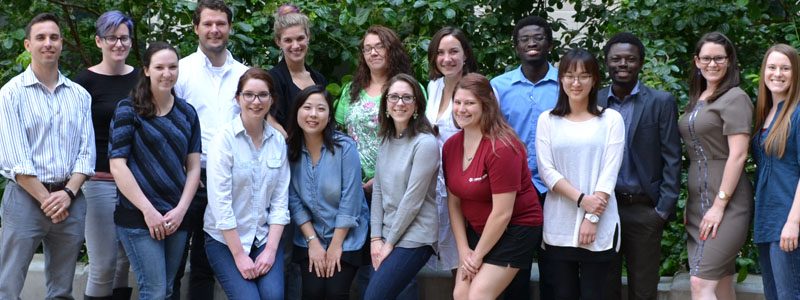About the Graduate Program
Welcome to Graduate Programs in English
At Texas A&M, we offer two degrees: a Master of Arts and a Doctor of Philosophy.
All PhD and the majority of MA students in English are supported by assistantships. We also have very generous funding for conference presentations, research travel, and participations in workshops and seminars.
Graduate students in English benefit from an innovative curriculum, excellent scholarly and pedagogical training, and a vibrant intellectual community. We have an internationally prominent faculty and a diverse and professionally active student body. Check out news about our students at the Spotlight on Graduate Student Research page.
In English at A&M, we have strengths in areas ranging from Medieval Studies to Twenty-First Century Studies, with special emphases in the Transatlantic 19th Century, Gender and Sexuality, Digital Humanities, and Children’s Literature. We typically offer eleven or twelve courses each semester, and all courses are capped at 15 students, with the majority smaller than that. Graduate students can also earn certificates in Women’s and Gender Studies, Film Studies, Africana Studies, and Digital Humanities.
Our Faculty
Our award-winning faculty members have been recognized with major fellowships such as the NEH, Guggenheim, and ACLS and with multiple teaching awards at the university level; we publish in top-tier journals such as PMLA, Callaloo, New Literary History, American Literary History, Modern Philology, and Postmodern Culture.
Our strengths and intellectual diversity are reflected in recent publications, which include Vanita Reddy’s Fashioning Diaspora: Beauty, Feminity, and South Asia American Culture (Temple University Press), Amy Earhart’s Traces of the Old, Uses of the New: The Emergence of the Digital Literary Studies (University of Michigan Press); Laura Mandell’s Breaking the Book: Print Humanities in the Digital Age (Wiley-Blackwell); Nandra Perry’s Imitatio Christi: The Poetics of Piety in Early Modern England (University of Notre Dame Press),Ira Dworkin’s edition of Narrative of the Life of Frederick Douglass, An American Slave (1845) by Frederick Douglass (Penguin Classics), Britt Mize’s Traditional Subjectivities: The Old English Poetics of Mentality (University of Toronto Press), Bob Boenig’s C.S. Lewis and the Middle Ages (Kent State University Press), Shona N. Jackson’s Creole Indigeneity: Between Myth and Nation in the Caribbean (University of Minnesota Press), Nandini Bhattacharya’s Hindi Cinema: Repeating the Subject (Routledge), Jessica Howell’s Exploring Victorian Travel Literature: Disease, Race and Climate (Oxford University Press), Emily Johansen’s Cosmopolitanism and Place: Spatial Forms in Contemporary, Anglophone Literature (Palgrave MacMillan), Michael S. Collins’s Understanding Etheridge Knight (The University of South Carolina Press), Margaret J.M. Ezell’s book chapter “Late Seventeenth-Century Women Poets and the Anxiety of Attribution” (Early Modern Women and the Poem, University of Manchester Press), Anne Morey’s edited volume Genre, Reception, and Adaptation in the ‘Twilight Series’ (Ashgate), and Mikko Tuhkanen’s The Cambridge History of Gay and Lesbian Literature, co-edited with E.L. McCallum (Cambridge UP)
Professionalization and Teacher Training
The English Department has a strong record of supporting and mentoring graduate students. Our students have the opportunity to teach a range of undergraduate courses, both face to face, and online. We have an excellent training program for graduate student teachers, including a workshop in August before classes begin, a formal pedagogy course, and a mentoring system for graduate student teachers.
We take seriously the professional development of our students; each semester, we organize panel discussions and workshops of topics ranging from writing abstracts, preparing for prelims, choosing journals for the submission of articles, compiling a teaching portfolio, and narrowing down a dissertation topic.
Our graduate students compete very successfully for research funding and awards through the Glasscock Center for Humanities Research on campus and within the College of Liberal Arts. Our students receive national recognition for their work through, among others, acceptance into seminars at the Folger Institute, the English Institute, the School for Criticism and Theory, Rare Book School, and Digital Humanities Summer Institute. Students who gain admission to these seminars and workshops receive generous funding from the Department.

